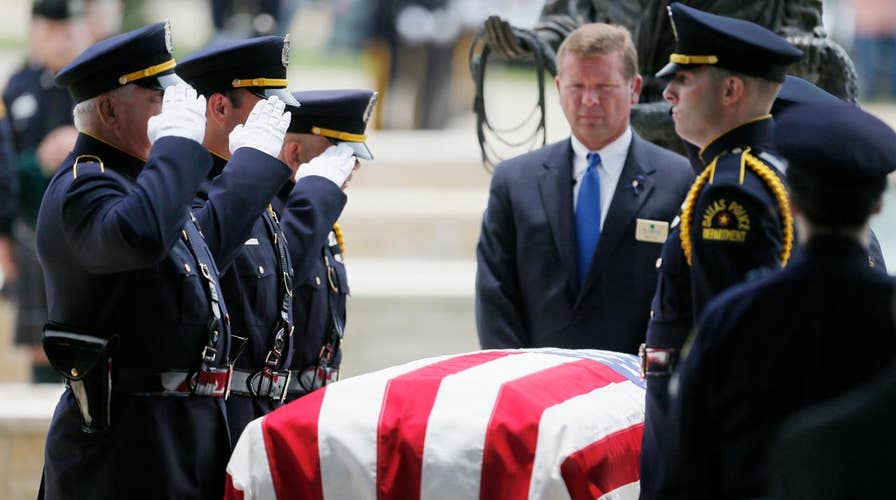FBI report: Media, Washington, BLM behind police killings
New FBI assailant report reveals influence of media, politicians, and Black Lives Matter on violence against and killing of law enforcement officers in America
Police officials say an internal FBI report released in April highlights what they have been saying all along: The “Ferguson effect” is negatively impacting law enforcement and could eventually lead to an increase in crime.
The report suggests the media, politicians and Black Lives Matter have weakened police officers and turned people against them – which in turn has caused an uptick in attacks against police. It has also emboldened people into refusing to comply with police orders, the report says, causing a “de-policing’ in law enforcement agencies across the country, “which the assailants have exploited.”
“The study amplifies things we have been saying about what was going on across the country…the trends…since Ferguson.” Ken Winter, executive director of Mississippi Association of Chiefs of Police, told Fox News. His organization posted the report on its Facebook page, calling it an “interesting study.”
FBI: BLACK LIVES MATTER-INSPIRED COP KILLINGS 'THE NEW NORM'
But a Black Lives Matter activist said the the four-page report is inaccurate and partly puts blame on a movement that “is one of love, peace, harmony and justice.”
“[The report was released to] make it seem that black folks are killing people because of the Black Lives Matter movement,” said Amir Islam, a BLM organizer and Seattle activist, adding that narrative is inherently untrue.
The April report showed 64 law enforcement officers were killed in 53 incidents in 2016. About 42 were killed the year before. In 2016, 28 percent of the assailants “expressed a desire to kill law enforcement officers prior to carrying out their attacks,” the report said.
“Specifically in the Dallas, TX, and Baton Rouge, L.A., attacks,” the report added, “the assailants said they were influenced by the Black Lives Matter movement, and their belief that law enforcement was targeting black males.”
“I can’t speak for those people, nor do I know what was really said.” Amir Islam told Fox News. “The information was given by law enforcement, who I heavily distrust, and those of us in our movement distrust.”
In broader terms, the study cites a “chill wind” on law enforcement as a major contributing factor in these attacks, saying “since 2014 multiple high-profile police incidents across the country have occurred that law enforcement officials believe influenced the mindset and behaviors of the assailants.”
THE LATEST: DISTRICT ATTORNEY COMPLAINED ABOUT COP'S CONDUCT
The report specifically cited the Michael Brown shooting in Ferguson, Missouri, in 2014, and the social disturbances that followed. The shooting, the report said, sparked a movement perpetuated by the media and politicians that made it “socially acceptable to challenge and discredit the actions of law enforcement.”
The report placed part of the blame on the media, which seemed to focus on stories that portrayed police officers as overly aggressive and corrupt.
But it was particularly harsh on politicians, saying police officers routinely felt politicians failed to stand up for them and instead fueled hostile feeling toward those upholding the law.
“Nearly every police official interviewed agreed that for the first time, law enforcement not only felt that their national political leaders publically stood against them, but also that the politicians' words and actions signified that disrespect to law enforcement was acceptable in the aftermath of the Brown shooting,” the report said.
Because of those politicians, the report said, criminals felt empowered to defy police officers and treat them in a hostile manner.
Winter told Fox News police officers now are less proactive because they don’t want to end up in a situation where they have to use deadly force. That, he said, is leading to “mediocrity.”
SESSIONS ORDERS REVIEW OF FERGUSON-STYLE POLICE REFORM DEALS
“One of the cornerstones of being effective is proactive policing.” Winter added “What we have seen since Ferguson, is a lot of police officers are choosing not to be proactive due to the backlash they are concerned about. Communities are suffering, citizens are suffering, and crimes are being committed that may not have been otherwise.”
In the long term, Winter said, it will lead to an uptick in crime. And everyone will be impacted by the changes, he said.
For example, “if shoplifters aren’t being arrested, people will pay more for items in stores who have to make back that lost money, or pay more for private security,” he said. “These are the types of effects that are occurring on a local level.”
The report also concluded that criminal justice reforms that reduce prosecutions and incarcerations, specifically among drug offenders, put criminals back on the street with an attitude of “beating the system.”
This will also lead to negative outcomes, Winter said.
“There is a split second decision inside a criminal’s head now that they can get away with it,” he said. “They are coming to that conclusion.”


